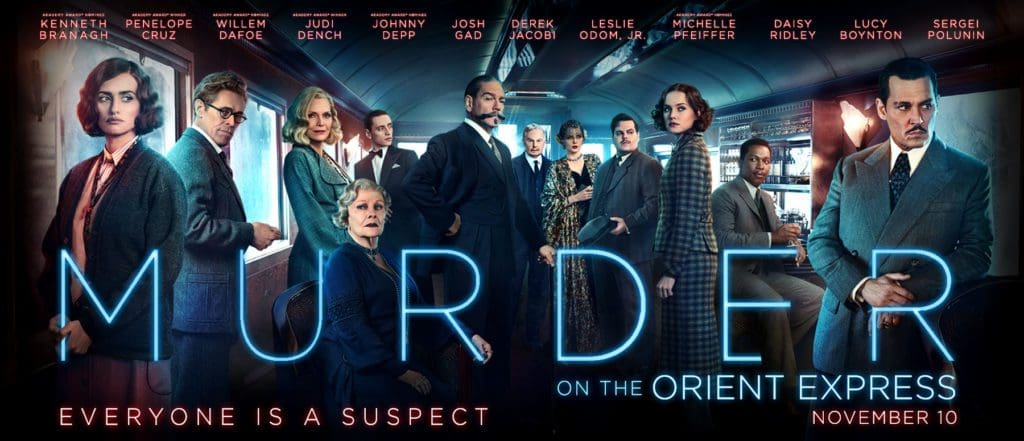What can only be described as the best pitch for Clue: The Movie, Murder on the Orient Express is a murder mystery movie based on the Agatha Christie novel of the same name. In this over the top presentation of investigation, interrogations, and improbabilities, Kenneth Branagh (who directs and plays the lead character Hercule Poirot) delivers a memorable performance, that is a lot of flash but little substance.
This is not to say that Murder on the Orient Express isn’t a pleasant experience. It just feels that the goal of this movie is to hit you over the head with elaborate costumes, elegant scenery, and a star-studded cast that will make your eyes dazzle as you are taken along through a fairly standard murder mystery plot. In this way, Murder on the Orient Express certainly achieves its goal.
The story follows world renowned detective, Hercule Poirot, as he attempts to solve a murder on a train with various suspects. As far as the plot goes that is basically the sum of it. The idea being, that Hercule must solve this mystery within the cramped conditions of a train car while dealing with the fact that the train has been derailed. In an effort to keep this review spoiler-free, the plot and solution go exactly as it does in the original novel, which is probably being one of the most unique solutions to a murder mystery.
Brannagh’s movie goes out of its way to make the setting feel much larger than it is. This is done through unique cinematography. The use of multiple overhead shots and constant motion to make you forget the reality that all of this is taking place on a stalled train. I personally was not a fan of the cinematography; the overhead shots were unique however, when used for too long it is hard to understand what is going on in the scene. The wide angles and constant motion are useful for flow, but at some point, it just felt that they were overused. This may be a minor quibble, but sometimes it is nice to just have an establishing shot of two people at a table having a discussion instead of constantly moving back and forth.
Kenneth Branagh certainly cements the larger than life feel of Murder on the Orient Express with his performance. He plays Poirot in such a grandiose manner that it makes the character feel more like a conquering hero than a mere investigator. Branagh works well with the rest of the cast in this ensemble piece. Given the magnitude of the cast, it is hard to pick a standout performance. However, everyone certainly contributes to the piece so you understand who every character is when the final accusation comes.
The character of Poirot that is presented is interesting — a man who can only see the imperfections of the world which makes him an incredible detective but makes his own personal life slightly vexing. As Poirot conducts his investigation it is made clear that there are thing Poirot can see and discern that no one else can. This can be frustrating though because as an audience member, as sometimes you have no idea how he get to his conclusions.
There’s also pacing issues throughout the film. The first act has a very quick pace, but everything slows down as soon as the murder happens. This makes the film feel way too long at the end — which is the film’s biggest issue. I understand that this is the movie building up the climatic reveal, but so much has been told already that it does not need to be teased out as much as it is.
Despite its flaws Murder on the Orient Express gives a pleasant movie going experience. The movie is mostly flash with an excellent lead in Branagh, a talented ensemble cast, elegant set and costume, and the feel of a movie that is larger than is actually.
Interestingly, all in all the movie is about a single murder, but the movie treats this crime with so much severity that it feels like the stakes are so much greater. This is not to say that it is not a heinous crime, but a murder on the train might be a set of dialogue in any other movie. So, in this way, it is nice to watch a movie where the stakes aren’t about the end of the world.


